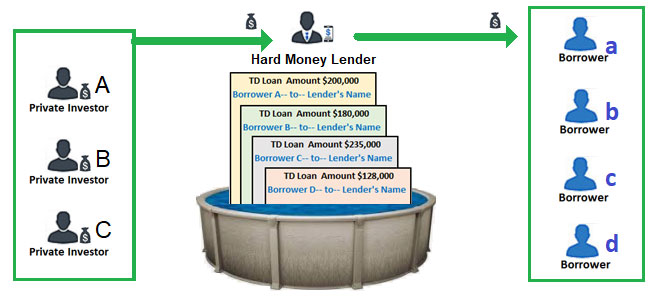The Function of Hard Cash Loans in Real Estate Transactions: What You Required to Know
Hard money financings are an essential financing device in realty purchases. They provide investors quick access to capital, particularly in urgent situations. Guaranteed by real residential property, these finances concentrate on asset value instead than the borrower's credit rating. They come with noteworthy threats and prices. Recognizing the nuances of difficult cash lendings is vital for anyone looking to browse this intricate economic landscape effectively. What aspects should financiers take into consideration before proceeding?
What Are Hard Cash Lendings?
Tough money loans act as a crucial financing alternative in actual estate transactions, especially for capitalists seeking fast access to funding. Unlike traditional financings, difficult cash lendings are secured by actual home and are largely based on the worth of the asset instead of the customer's creditworthiness. These fundings are normally used by personal loan providers or financiers, making it possible for debtors to bypass extensive authorization processes connected with standard funding.
Difficult money lendings are frequently temporary solutions, with repayment durations varying from a few months to a few years. Because of their expedited nature, they are prominent amongst realty fins and those needing immediate funds for home purchase or rehab. Passion prices for tough money finances often tend to be greater than standard financings, mirroring the enhanced risk lending institutions embark on. In general, tough money loans satisfy a crucial role in the property market, providing to those who need versatility and speed in their funding alternatives.
Advantages of Hard Money Loans
While typical financing can be slow and troublesome, difficult cash finances use a number of distinct benefits that attract investor. One crucial benefit is the rate of the funding procedure; finances can typically be approved and moneyed within days, enabling investors to take chances promptly. This quick turn-around is specifically beneficial in affordable markets where time is important.
In addition, difficult money fundings are primarily asset-based instead than credit-based, indicating that financiers with less-than-perfect credit scores can still secure funding. This ease of access enables a wider variety of financiers to take part in property deals.
Difficult cash loan providers generally have much more versatile terms and problems compared to standard lenders, enabling for tailored repayment plans customized to private project requirements. This versatility can enhance a capitalist's ability to take care of money circulation successfully throughout renovation or resale stages. On the whole, these benefits make hard money loans an engaging option for many property ventures.
Prospective Drawbacks to Think About
While hard cash car loans can provide quick financing, prospective disadvantages necessitate mindful consideration. Borrowers commonly face higher rates of interest contrasted to typical financing, which can enhance general expenses. Additionally, the much shorter payment terms may pressure customers to secure refinancing or offer the residential or commercial property earlier than anticipated.
Greater Rate Of Interest
Greater rates of interest represent a substantial factor to consider in hard money financings, specifically in realty transactions. These loans commonly come with rates that are significantly greater than typical funding options, typically ranging from 8% to 15%. This elevated expense can influence the overall productivity of an actual estate financial investment, as customers might discover themselves allocating a bigger section of their budget to interest payments. In addition, the high prices can create obstacles for capitalists looking for to leverage their capital successfully. For those that are not gotten ready for these monetary effects, the concern of high-interest payments can bring about cash flow issues, eventually impacting the success of the property financial investment. For that reason, recognizing the implications of higher rates of interest is necessary for possible customers.
Shorter Settlement Terms
Shorter settlement terms are a specifying quality of difficult money lendings, which can provide various challenges for consumers. Generally varying from six months to 3 years, these terms need customers to pay back the finance swiftly, usually bring about monetary pressure. The stress to generate returns within a minimal duration can push borrowers to rush residential property improvements or sales, potentially endangering the quality of the financial investment. Additionally, the requirement of a speedy leave method may restrict alternatives for refinancing or selling, leading to greater threats. Debtors must carefully consider their monetary capacities and market conditions to prevent failing on these fundings, which can lead to the loss of the collateralized property.
How Hard Cash Car Loans Function
Tough money fundings operate with a special structure that focuses on possession worth over creditworthiness. The approval procedure is commonly swift, allowing consumers to access funds rapidly compared to conventional financing. In addition, an exam of rates of interest exposes that tough money financings commonly lug greater prices, mirroring the raised danger taken by lending institutions.
Funding Framework Discussed

In realty transactions, understanding the structure of difficult money financings is necessary for capitalists seeking fast financing. Difficult cash car loans are typically safeguarded by realty, with the property working as security. These finances generally include higher passion prices compared to standard financing, showing the enhanced threat taken by lenders. The loan terms are usually short, often ranging from 6 months to three years, helping with quick access to capital. Car loan quantities can differ substantially, often relying on the building's value rather than the customer's creditworthiness. Investors profit from the expedited approval process, allowing them to take financial investment opportunities without delay. On the whole, the framework of tough cash finances satisfies those needing quick, flexible funding choices in realty markets.
Authorization Process Summary
The authorization procedure for hard money car loans stands out from standard borrowing approaches, mainly concentrating on website the collateral as opposed to the consumer's credit rating profile. Lenders assess the value of the residential property being utilized as security, guaranteeing it meets their requirements for risk evaluation. Once a property is recognized, debtors send a financing application that consists of information about the home and the planned use funds (Georgia hard money lenders). The loan provider performs a quick evaluation and may require extra paperwork, yet the procedure is generally quickened contrasted to traditional financings. Authorization typically occurs within days, enabling debtors to accessibility funds quickly. This streamlined approach is beneficial genuine estate investors seeking fast financing solutions for acquisition or improvement projects
Rate Of Interest Contrast
While hard money financings offer fast accessibility to funds, their rate of interest prices are usually more than those of typical mortgages. Debtors can expect rates varying from 8% to 15%, depending upon the lender and the specifics of the deal. On the other hand, traditional mortgage prices generally fall in between 3% and 6%. The greater rates related to difficult money loans reflect the raised danger lending institutions take, as these fundings are commonly secured by the property itself as opposed to the borrower's credit reliability. This implies that while hard money financings can assist in swift funding genuine estate financial investments, they can likewise bring about considerably higher expenses in time, making it necessary for borrowers to very carefully review their monetary situation before continuing.
When to Use Hard Money Financings
When is it sensible to contemplate hard cash car loans in property deals? Financiers usually think about these finances in situations where traditional funding is either impractical or unavailable. For example, hard cash lendings can be advantageous for residential properties requiring quick purchase, such as repossession public auctions or distressed residential properties needing instant remodellings.
Furthermore, investor looking for to profit from time-sensitive chances, like flipping houses, may find hard cash lendings useful due to their expedited authorization procedure. Borrowers with less-than-perfect credit rating or unconventional residential or commercial properties may likewise opt for tough money funding, as lenders mainly concentrate on the home's value instead than the debtor's financial background.
Tips for Picking a Difficult Cash Lender
Just how can investors guarantee they pick the right hard money lending institution for their realty requirements? Initially, extensive research study is crucial. Capitalists should assess prospective lending institutions by examining their credibility, customer, and experience endorsements. It is suggested to choose lenders that focus on the type of residential or commercial property being funded, as this can boost the likelihood of positive terms.
Next, understanding the loan provider's terms and problems is significant. Investors must ask about rate of interest, costs, and settlement schedules. Clear communication is important; lending institutions need to want to clear up any kind of uncertainties.
Additionally, reviewing the lender's financing speed and adaptability can be advantageous, specifically in open markets. Investors ought to also consider developing a connection with the lender, as a great connection can assist in smoother transactions. Getting in touch with market professionals or actual estate agents can provide more insights and recommendations, making certain an educated decision.
Frequently Asked Questions
Can Hard Cash Loans Be Utilized for Industrial Characteristics?
Tough money lendings can undoubtedly be used for business properties, providing fast funding options for investors - Georgia hard money lenders. These car loans are usually secured by the residential property itself, allowing consumers to accessibility funds without typical borrowing demands
What Is the Normal Loan-To-Value Proportion for Hard Money Loans?
The common loan-to-value proportion for difficult cash financings usually varies from 60% to 75%. This ratio varies based upon the property kind, lender policies, and private debtor circumstances, mirroring the greater threat connected with these lendings.
Are Hard Cash Car Loans Readily Available to Novice Homebuyers?
Difficult cash finances can be accessible to newbie buyers, though terms vary by lending institution. These fundings commonly have higher interest prices and much shorter payment durations, making them a less traditional selection for brand-new purchasers.
How Swiftly Can I Close on a Difficult Money Financing?
The speed of shutting on a tough cash loan can vary, but typically it varies from a few days to a number of weeks, depending upon the lender's requirements and the customer's financial circumstance. (Georgia hard money lenders)
What Records Are Needed to Look For a Difficult Money Lending?

Unlike standard lendings, hard cash fundings are safeguarded by actual home and are mostly based on the worth of the possession rather than the consumer's creditworthiness. Passion prices for tough cash fundings tend to be higher than conventional fundings, mirroring the increased risk lending institutions take on. The approval process for hard money fundings is distinct from traditional financing approaches, largely concentrating on the collateral instead than the consumer's debt account. The higher rates linked with difficult cash finances show the increased risk lending institutions take, as these car loans are often safeguarded by the property itself rather than the borrower's creditworthiness. To use for a hard cash loan, consumers normally need to supply residential or commercial property details, a finance application, evidence of revenue, credit background, and recognition.